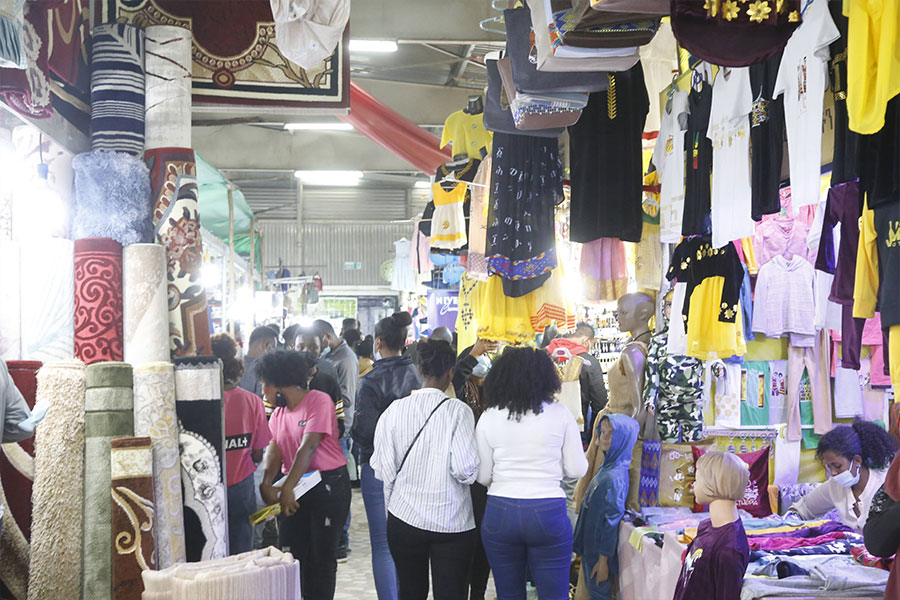
Commentaries | Apr 25,2020
Latecomer vendors are running around trying to set up their shops before working hours come to an end and shoppers begin to flood in. Others are eagerly calling on passersby, enticing them to buy their goods, most of which seem to be hygiene and beauty products. These were the scenes the day after the opening of this year's edition of Jorka Events' Christmas Bazaar & Exhibition at MIDROC Ethiopia's Mechare Meda, located in the neighbourhood of Sarbet.
The site began hosting shoppers and vendors from all over the capital on December 27, 2020, and will stay open until the eve of Ethiopian Christmas. Although the venue is not looking as lively as past bazaars, the welcoming faces and eagerness of saleswomen and men make up for it.
Nebyou Bereket, a young salesperson, has participated in at least four holiday bazaars over the years. When opportunities in Addis Abeba dried up with the rise of the Novel Coronavirus (COVID-19) pandemic, he moved back to his hometown of Gonder. He took a job as a salesperson in his family business. When he heard that the Christmas Bazaar would be organised, he travelled some 600Km to the capital to take part.
"Friends tell you when something pops up," he said, explaining how he got hired for this gig.
The opening of this Bazaar is a much-needed opportunity to generate additional income for the likes of Nebyou. He works for a men's clothing shop that occupies a far corner in the Bazaar's shopping area. When comparing the market to those he has participated in over previous years, he asserted that shoppers' volume is remarkably lower. He noted the market was better on Sunday.
"Today, people aren't even asking for prices," he complained.
Jorka Events, an event management company, has organised a Christmas holiday bazaar every year since it first became operational six years ago. Jorka has been hosting these events at Millennium Hall, which is currently serving as a COVID-19 treatment centre.
Other holiday bazaar and exhibitions were also hosted at the Exhibition Centre & Market Development Enterprise, located at Mesqel Square, for over two decades. The venue has temporarily been closed following the construction of the underground parking garage at Mesqel Square.
The event organising business has been dead for the past year, according to Tadesse Tamrat, public relations officer for Jorka Events. After considering that the public has made strides in adapting to COVID-19 preventive mechanisms and protocols, Jorka decided to go ahead with their annual tradition and organise a bazaar for Ethiopian Christmas, according to him.
"We were given a permit with strict guidelines," he explained.
The Addis Abeba City Administration, which is in charge of issuing permits for these kinds of events, has prohibited the organisers from hosting more than 3,000 people a day. They are also obligated to implement all preventive measures and provide masks and sanitiser free of charge. Jorka charges 50 Br as an entrance fee.
Jorka's bazaars usually accommodate 7,000 to 10,000 people a day, according to Tadesse. Even though 3,000 is a significantly low number in comparison to past events, the organisers decided it is still better than not hosting altogether. Jorka has registered 250 local and foreign vendors to participate in the Bazaar, 100 fewer vendors less than in previous years.
Organisers also decided to offer a 50pc discount on registration fees, hoping that vendors will, in return, offer their goods and services for lower prices.
"Bazaars are supposed to be low-priced, but that's not usually the case," he said." We made a significant discount so shoppers could actually benefit."
He claims that vendors and shoppers look to have been hungry for such a market. Unlike previous years, shoppers have been coming in the beginning from the opening day, while in the past, attendance usually spiked in the few days preceding the holiday, according to Tadesse.
Atlaw Alemu (PhD), a lecturer at Addis Abeba University’s Faculty of Business & Economics, explains that the weakened economy needs to revive with trading activities like a bazaar.
"It is clear that the economy needs trading activities," said Atlaw.
However, if preventive measures are not properly implemented, these positive market movements could easily fall apart, pointed out the expert. If COVID-19 cases surge even more, lockdown might become necessary, which will be drastic for the already strained economy, according to Atlaw.
"For people to survive, it is obvious that the seller has to sell and the consumers have to buy, but we should be persistent in protecting ourselves, whether cases are high or not. That's the only way the economy can survive," stated Atalw.
Jorka has put together a security team composed of security guards, private guards and firefighters. The security personnel are in charge of ensuring that preventive measures are properly implemented, especially for the musical performances where attendants will be more lax due to alcohol consumption.
In its weekly report, the Ethiopian Public Health Institute (EPHI) has detailed challenges it has encountered in the fight against COVID-19. Low public adherence to preventive measures and the rapid spread of the virus due to mass gathering events are among the reported problems.
The detection of a new variant of SARS-CoV-2 first observed in the United Kingdom in September, and its likeliness of importation is listed as a future threat.
The new strain has been detected in places like India, USA, South Africa and Canada. There is a growing concern among health professionals as the new variety's behaviour is yet to be studied, and many critical questions remain unanswered. What has been discovered so far suggests that the new strain is more infectious.
After the expiration of the state of emergency, the Ministry of Peace is no longer in charge of providing the permits to host events, explained Mengistu Abera, head of communications at the Ministry of Peace.
"Events can be hosted following guidelines set by EPHI," he added.
Yehualaw Getahun, a disease prevention expert at EPHI, states that mass gatherings should not be held unless necessary, especially not when a mutated variant of COVID-19 that is more infectious is rapidly spreading around the globe.
The Prevention & Control of the COVID-19 Pandemic directive, effective October 5, 2020, obliges individuals to always wear face masks. It also stipulates that individuals are prohibited from receiving services if they are not wearing face masks.
The respective authorities and ministries are issuing permits and licenses for events although Yehualaw finds it hardly necessary altogether.
"There is a protocol developed in collaboration with EPHI that the authorities are using," said Yehualaw.
In those protocols, event organisers are given clear instructions on how to accommodate people safely. Besides, the protocols are used to govern the operations of the authorities themselves.
Regardless, unprotected shoppers are noticed roaming around. Two young women shopping for lip gloss were browsing without face masks at the event.
"It was hot, so we had to take it off," said one of them. The exhibitors further explained that they were not concerned about contracting the virus as they are sure they have already had it. "We didn't get tested, but we experienced all the symptoms."
Tinsae Alemayehu (MD), a pediatric infectious disease specialist practising at the American Medical Centre, believes it is not appropriate to host mass gatherings. He mentioned that the Ministry of Health has recently announced that all intensive care units are at capacity.
"This is the time to focus on prevention," said Tinsae. Public health experts project that Ethiopia will experience the highest cases recorded in the coming months unless vaccines arrive.
According to Tinsae, the spread of the new strain of COVID-19 is a threat. Even disregarding that, he asserted that re-infection is a real risk.
"People are re-infected twice or thrice here in Ethiopia," he said.
Strong preventive measures should be implemented like in the early days of the pandemic, and public figures and media should set an example, recommended Tinsae.
A shopping area at the Bazaar is dominated by hygiene and beauty product vendors and clothing stores.
PUBLISHED ON
Jan 02,2021 [ VOL
21 , NO
1079]

Commentaries | Jun 05,2021

Covid-19 | May 31,2020

Viewpoints | Jun 01,2024

Viewpoints | Dec 04,2022

Featured | Sep 04,2021

Dec 22 , 2024 . By TIZITA SHEWAFERAW
Charged with transforming colossal state-owned enterprises into modern and competitiv...

Aug 18 , 2024 . By AKSAH ITALO
Although predictable Yonas Zerihun's job in the ride-hailing service is not immune to...

Jul 28 , 2024 . By TIZITA SHEWAFERAW
Unhabitual, perhaps too many, Samuel Gebreyohannes, 38, used to occasionally enjoy a couple of beers at breakfast. However, he recently swit...

Jul 13 , 2024 . By AKSAH ITALO
Investors who rely on tractors, trucks, and field vehicles for commuting, transporting commodities, and f...

Oct 4 , 2025
Eyob Tekalegn (PhD) had been in the Governor's chair for only weeks when, on Septembe...

Sep 27 , 2025
Four years into an experiment with “shock therapy” in education, the national moo...

Sep 20 , 2025
Getachew Reda's return to the national stage was always going to stir attention. Once...

Sep 13 , 2025
At its launch in Nairobi two years ago, the Africa Climate Summit was billed as the f...